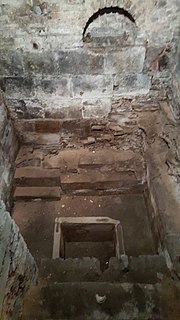 W
WIn Judaism, Hagalah is a method of making utensils suitable for use with kosher food by immersing utensils in boiling water.
 W
WJewish law and custom prescribe ritual hand washing in a number of situations. This practice is generally known by the Hebrew term נטילת ידיים, which literally means taking up of the hands.
 W
WImpurity after childbirth is the religious or cultural belief that a new mother is in a state of uncleanliness or pollution, requiring ritual purification. It is connected to the seclusion imposed by the expectations of postpartum confinement, and more broadly to the taboos around menstruation and bleeding.
 W
WMidras uncleanness is one of the forms of ritual impurity in Judaism which can be transmitted by either an object or person. The term may be translated as pressure uncleanness.
 W
WThe Mikvah of Strasbourg is a historic site in Strasbourg, in the French department of Bas-Rhin.
 W
WMikveh or mikvah is a bath used for the purpose of ritual immersion in Judaism to achieve ritual purity.
 W
WThe red heifer, a female bovine which has never been pregnant or milked or yoked, also known as the red cow, was a cow brought to the priests as a sacrifice according to the Torah, and its ashes were used for the ritual purification of Tum'at HaMet, that is, an Israelite who had come into contact with a corpse.
 W
WIn Judaism, ritual washing, or ablution, takes two main forms. Tevilah (טְבִילָה) is a full body immersion in a mikveh, and netilat yadayim is the washing of the hands with a cup.